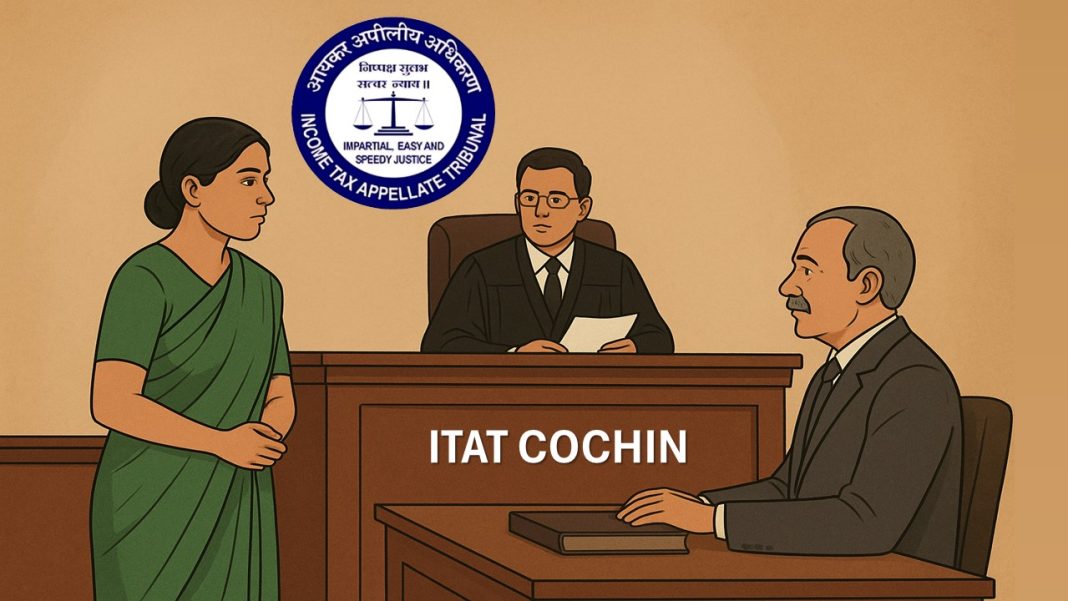ITAT Cochin Deletes Penalty of Rs. 2.20 Lakh for Gratuity Exemption Claim Filed in Good Faith
The present appeal has been filed by an individual named Chundayil Kalam Girijadevi (Deceased) against the Income Tax Officer, Ward 1 & TPS, Palakkad, Kerala (Respondent) in the Income Tax Appellate Tribunal (ITAT) “DB” Bench, Cochin, Shri Inturi Rama Rao (Accountant Member) and Shri Rahul Chaudhary (Judicial Member). The case was heard on August 21, 2025, and the final decision was released on September 22, 2025.
The appeal has been filed challenging an order dated July 14, 2025, passed by the National Faceless Appeal Centre (NFAC), Delhi [CIT(A)] under Section 250 of the Income Tax Act, 1961, where the authority dismissed the penalty Order, dated 02/08/2021, passed under Section 270A of the Act for the Assessment Year 2018-2019.
Assessee is a retired employee of Kerala State Finance Co-operation during the Financial Year 2017-18 (Assessment Year 2018-19). On August 06, 2018, the assessee filed his income tax return (ITR), claiming exemption of Rs. 10 Lakh under Section 10(10) of the Act on grounds of gratuity received on retirement. After that, the assessee filed a revised return claiming a higher exemption of Rs. 20 Lakh. This grabbed the attention of the tax authorities in the matter and selected the return for scrutiny. The AO argued that the exemption under Section 10(10) of the Act only applies in case of retirement on/after March 29, 2018, and since the assessee’s retirement occurred in Financial Year 2017-18, he is not eligible to claim the said exemption of Rs. 20 lakh. Hence, the AO did not approve the claim and completed the assessment at an assessed income of Rs. 36.899 lakh as against a returned income of Rs. 26.899 lakh.
Additionally, the assessing officer (AO) imposed a penalty of Rs. 2.20 Lakh under Section 270A(1)/(9) of the Act on the grounds that the assessee misreported income. Assessee, dissatisfied with the action of the AO, approached the CIT(A). However, the CIT(A) rejected the appeal of the assessee, claiming that he did not bring any record material to substantiate reasonable cause for not offering income of Rs. 10 lakh to tax and for claiming the higher exemption of Rs. 20 lakh. Thereafter, the assessee filed an appeal before the appellate authority.
We have carefully listened to both sides and reviewed the documents. In this case, a penalty was imposed on the Assessee for allegedly misreporting income under Section 270A(9), which applies to cases involving misrepresentation or hiding facts. However, after checking the records, we found that the Assessee did not hide any facts or mislead the department.
The Assessee filed a revised return to claim a higher exemption, and all the relevant details were shared honestly. The Assessee believed in good faith that they were eligible for an additional deduction of Rs. 20 Lakh on gratuity. When the Assessing Officer rejected this claim, the Assessee accepted the decision and paid the extra tax without filing any appeal.
Therefore, based on the facts that the assessing officer (AO) was incorrect to say that the assessee underreported income, and even if the income was underreported, the Assessee should get the benefit of immunity under Section 270AA since the tax was paid and no appeal was filed. Therefore, considering the aforementioned facts of the case, the tribunal cancelled the penalty of Rs. 220,000 under Section 270A imposed on the assessee.
- Final result: The Assessee’s appeal is allowed.
- Citation: Chundayil Kalam Girijadevi (Deceased) Vs Income Tax Officer (ITAT Cochin); ITA No.564/COCH/2025; 22/09/2025; 2018-2019
Refer to the official judgement for complete information.



